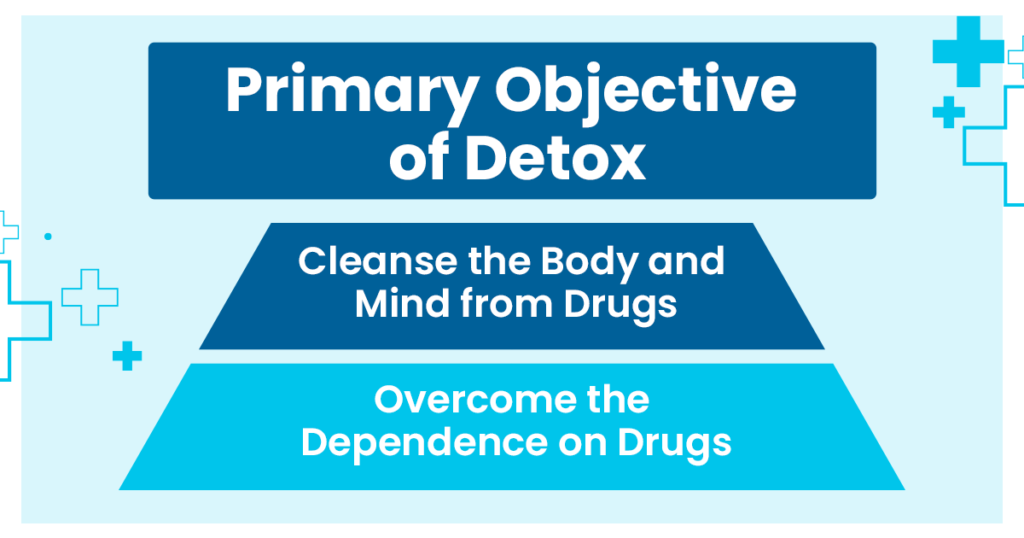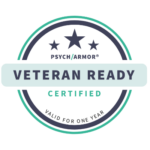
Most people who try to stop using drugs cold turkey are ambitious and confident that they can succeed. The withdrawal symptoms, however, then begin. Withdrawal symptoms can differ in duration and severity, and symptoms will also manifest in different ways, depending on what substances a person has used. For example, cocaine addicts who go through detox run the danger of being depressed, but alcohol addicts who go through detox run the chance of having a seizure.
The detox and withdrawal process length might also change based on a person’s mental health, metabolism, weight, and degree of addiction. Additionally, those dependent on many drugs may go through a lengthier, more intense withdrawal and detox period. For individuals wishing to get clean from drug abuse, understanding the withdrawal and detox phase for each substance might make the process seem less frightening.
What is Detox?
Drug detoxification (detox) is the process by which all traces of drugs are eliminated from the body, preparing the individual to begin treatment to overcome their addiction. Although it is not usually included in addiction treatment, it is generally expected when entering recovery.
The bodies of drug addicts become used to having these chemicals in their systems. During detox, when these drugs are gradually decreased and removed, the brain will have to adapt to the rapid decrease in these chemicals. This often results in a collection of unpleasant symptoms known as “withdrawal symptoms.”
The drug and alcohol detox process aims to reduce withdrawal symptoms’ severity and make the experience as safe and comfortable as possible. The most efficient detoxification method is one that is medically assisted and supported by trained medical professionals. Typically, this occurs at specialized detox centers under medical supervision and care of healthcare professionals. Self-detoxification is seldom successful, and individuals would likely undergo unwanted withdrawal symptoms and lose motivation after several failed efforts.
The Process of Detoxification
Several steps make up the detoxification process. The details depend on the doctor in question and the precise type of drugs to which someone is hooked.
Detoxification will differ for each person. Additionally, even if someone has undergone the process before, every detoxification process is different.
The normal detox procedure is outlined in the next following steps.
Identification
The first stage is for the provider to get to know the individual seeking help. It is essential for a physician to understand the frequency, quantity, and duration of a patient’s substance abuse and addiction.
Cessation
The next step is for the individual with substance use disorder to gradually lower or quit substance use. It is essential to do so under the supervision of a physician or other qualified medical expert who can assist with symptom reduction in a hospital or other medical setting.
Moderate the Effects
After a person quits taking a certain substance, their body must eliminate all traces of that substance.
As soon as a person quits using alcohol or drugs, withdrawal symptoms will manifest. Depending on the sort of substance used, symptoms might differ.
One of the objectives of medical detoxification is to provide support for symptom management. This may involve IV hydration, over-the-counter drugs, or even prescription drugs that may alleviate dangerous withdrawal symptoms and make the treatment more tolerable.
Monitor the Effects
As a patient undergoes this process, the medical professional will monitor vital signs. These include the temperature, heart rate, blood pressure, oxygenation, and breathing rate.
Taper the Treatment
Tapering is the steady reduction of a patient’s drug dosage. Instead of suddenly discontinuing drugs, the process will come to a gradual conclusion. This allows for the avoidance of rebound or reactive symptoms.
If additional medications are needed to aid in the withdrawal process, they will also be reduced over the period of many hours to days.
Release
The final stage concludes the detoxification process and prepares the patient for the subsequent phase: effective treatment.
After a person completes the withdrawal process and their system has been cleansed of drugs, it is crucial that they develop skills to help them remain sober for the long term.
What Happens During Medically Assisted Detox?
Evaluation
The first stage in a medically assisted detox entails the patients undergoing a comprehensive medical evaluation so that a precise picture of their particular needs may be constructed. During this evaluation, an expert will collect information about the patient’s medical history and addiction in order to build a specific detox strategy.
Withdrawal Phase
When the amount of substance in a patient’s system is steadily reduced, withdrawal symptoms generally emerge. Alcohol and drug withdrawal symptoms can be quite similar; therefore, many detoxing individuals may experience similar symptoms.
However, the nature and severity of withdrawal symptoms vary on how long a person has been addicted to alcohol or drugs, the sort of substance to which they are hooked, how much they have been consuming, and their overall mental and physical health.
It is essential to know that each individual undergoes detox differently and that every detox is absolutely distinct, regardless of whether a person has previously undergone detox.
Medications
As part of the detoxification process, patients will be given adequately regulated medication to assist them in coping with withdrawal. There is no medicine that can avoid all withdrawal symptoms, but certain medications can alleviate anxiety and depression, promote adequate sleep, and mitigate as many problems as possible.
Around the Clock Medical Support
According to research, supportive and empathetic care is equally as crucial as medicine for facilitating a successful detox and achieving the best outcomes for patients. Therefore, any individual undergoing detox at The Haven Detox-South Florida can anticipate being closely watched 24 hours a day for the course of the treatment.
How Long Does it Take for Someone to Detox from Drugs?
Most people who are unfamiliar with addiction may picture the newest fad diet or the juicing craze when they hear the word “detox.” But for those dependent on drugs or alcohol, the word “detox” has a darker, more menacing connotation.
When drugs are abused, the body and brain develop a tolerance to the substance. Consequently, a user will consume ever-increasing amounts of the substance in an attempt to get the same euphoric feelings or high. Eventually, the body becomes functionally reliant on that chemical. When a user is unable to get the required amount of drugs, they will experience severe withdrawal symptoms.
For many individuals, the withdrawal process can be unpleasant and stressful. In rare instances, withdrawal symptoms might be potentially dangerous.
Getting professional help during withdrawal and detox is optimal for patient safety and reducing the intensity of withdrawal symptoms.
The duration of detoxification for various substances varies. Moreover, if a person is addicted to many substances, the recovery process may take longer and the symptoms may be more severe. The following drugs can be detected in a standard urine test for these time periods:
- Marijuana and THC: 1 to 7 Days
- MDMA: 2 to 4 Days
- Cocaine: 2 to 3 Days
- Methamphetamine: 2 to 3 Days
- Heroin: 1 to 3 Days
- Alcohol: 12 to 24 Hours
This does not imply that a person would have withdrawal symptoms for the same length of time. Typically, withdrawal symptoms last for a few weeks. In extreme situations, an individual may develop PAWS, Post-Acute Withdrawal Syndrome. This disease is characterized by withdrawal symptoms that last for months or years after cessation. PAWS is most common in opioid abusers in recovery; hence, drug replacement therapies can be effective for these patients.
Also, detoxing from prescription medication may differ significantly. Many prescription drugs are available in both time-release and non-time-release formulations. Time-released prescription drugs might take longer to leave a person’s system since they are digested more slowly.
Types of Detox Treatment
Outpatient Drug Detox
Outpatient drug detox is less common and is performed while the patient is still living at home or, occasionally, in a sober living facility. Outpatient treatment might be considered for mild to moderate cases of early-stage addiction.
Individuals who choose outpatient detoxification should be extremely driven, disciplined, and have access to medical care. A recent National Institute on Drug Abuse (NIDA) study indicates that death rates are greater when opioid addictions are treated in this environment.
Inpatient Drug Detox
Patients seeking treatment at a residential drug treatment program participate in this sort of medical detox. The withdrawal process is closely monitored in this intensive and highly regulated setting. In general, detox spans from three to seven days. Several factors affect how long your detox takes and how long you endure physical symptoms:
- Amount of drugs used during addiction
- Length of addiction
- The particular drug has been used or abused that detox is needed
- A dose is taken before entering treatment or detox
- Use of other substances during addiction and immediately before drug detox
- Existence of any co-occurring mental health issues
- Time the specific drug stays in one’s system
During detoxification and withdrawal, several physical symptoms are to be anticipated. This varies by individual and often depends on the aforementioned variables as well.
- Restlessness
- Insomnia
- Mood swings
- Flu-like symptoms
- Change in appetite
- Agitation, irritability
- Depression
Due to the severe and unpleasant withdrawal symptoms, many people with addictions who attempt to quit on their own relapse and fail to go through this early stage of recovery. That’s the one reason why medically supervised detox at a drug treatment center can make a significant difference in successfully completing this initial phase and conquering addiction.
Is At-Home Detox Safe?
Some people think that alcohol and drug detox at home is their best option. As easy as home detox may sound, quitting drugs and alcohol without medical supervision or counseling is ineffective and perhaps harmful.
Self-detox at home may seem more straightforward, but medical supervision is required for a healthy detox. By receiving regular assistance from addiction specialists and following a customized treatment plan, you can reduce the likelihood of dangers, including:
Relapse
People suffering from drug use disorders who detox at home have an increased risk of relapse. Without a medical facility’s supportive setting and services, sobriety is even more challenging.
Overdose
This is something that all patients and their families hope to avoid, as it is deadly. Those who undergo ‘cold turkey’ alcohol or drug detox are at a considerably increased risk of relapse, leading to overdose when tolerance is lost.
Complications
People detoxing at home have an increased chance of experiencing seizures, delirium tremens, and other life-threatening physical symptoms due to the absence of medical care. At-home detoxification from alcohol or drugs can feel isolating, resulting in mental health problems like depression, anxiety, and paranoia.
How Effective is Detox?
It is difficult to evaluate the efficacy of the detoxification process since there are so many variables to consider. The relapse rates of persons who undergo medically-supervised detoxification may be one approach to measure the success of the treatment.
A group of experts assembled by the Substance Abuse and Mental Health Services Administration’s Center for Substance Abuse Treatment Office of Managed Care stated that “a detoxification program is not designed to resolve the long-standing psychological, social, and behavioral problems associated with alcohol and drug abuse.” Therefore, relapse, which does not signify therapeutic failure in any case, may not be a feasible method for measuring the success of detox.
Instead, it may be more beneficial to investigate why certain populations have lower relapse rates. According to some research, persons with a longer history of substance misuse or a family history of substance addiction may be more likely to relapse following detox.
On the other hand, people who engage in motivational interviewing, a therapy technique in which an individual’s reasons for stopping drug or alcohol usage are uncovered via questioning, may be less likely to relapse. Overall, detoxing in a medically supervised facility is more likely to be safer and reduce the likelihood of relapse than detoxing at home.
What Happens After Detox?
A detox facility’s staff will be able to assist you through this painful process with as little discomfort as possible. The average duration of a medical detox program is seven to ten days, and completion should elicit a tremendous sense of pride and success.
Your work is not quite finished, though. You may be feeling on top of the world after nearly two weeks of abstinence from drugs, and rightfully so. However, be cautioned that these emotions of elation do not endure long. Individuals might take a considerable amount of time to reach the point where they require a drug detox; thus, expecting to beat this disease in just two weeks is impractical.
The reality is that complete recovery from addiction can take a long time, and detoxification is only the important first step toward the road to sobriety. If you wish to recover entirely, you will need to follow detox with a rehabilitation program. The purpose of detox is to break the physical tie between the user and the substance, but it does not address the emotional or psychological aspects of the disease. Rehabilitation programs exist for just this purpose.
The good news is that people struggling with addiction may obtain the support they need to put their drug-abusing days behind them permanently by enrolling in one of the many excellent recovery programs available in inpatient or outpatient facilities.
Frequently Asked Questions (FAQs)
How long does it take to detox your body?
Detoxification from alcohol or drugs entails eliminating harmful chemicals from the body while concurrently controlling withdrawal symptoms. Typically, detoxing lasts between three and ten days. A more serious addiction might delay detoxification by many weeks or months.
What are the healthy ways to get rid of drugs?
Tips for staying drug-free:
Stay busy
Avoid stress
Exercise to relieve stress
End toxic relationships
Use your support system
Eliminate triggers
Practice positive self-talk
Which drug has the most withdrawal symptoms?
Opiates, heroin, and methamphetamine are some of the most powerful substances that result in withdrawal symptoms that can be fatal. During withdrawal, extreme delusion and hallucinations may force a person to harm oneself or others.
How can I detox from drugs safely at home?
The following tips can increase your chances of safely detoxing from drugs in the home environment:
Ask for support from a loved one
Set aside time to focus on detox
Gradually taper intake of alcohol
Stay physically active
Remove all alcohol from the home
Consider attending a 12-step meeting
Schedule relaxing activities
Get Personalized Care at The Haven Detox Facility
Detoxification is the first step toward recovery. It treats acute intoxication and withdrawal symptoms in a tightly supervised, encouraging, and drug-free setting. It entails assessing the patient’s condition, managing medications, and providing emotional support.
The Haven is a premier drug detox facility. Our state-of-the-art facility provides high-quality rehab treatment programs. Our mix of compassionate care and tailored treatment is intended to offer you the best chance of overcoming drug addiction permanently.
If you or anyone in your family members is battling alcohol or drug addiction, please call our counselor at (561) 328-8627 to get medical advice or to learn more about how we can assist you in starting a healthy and sober life.






